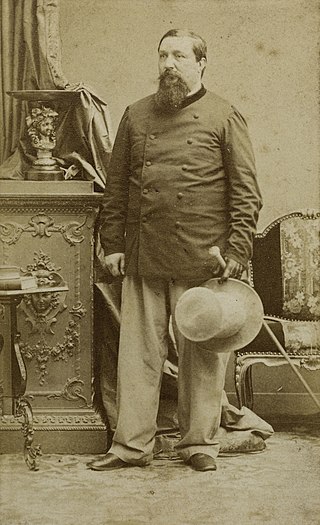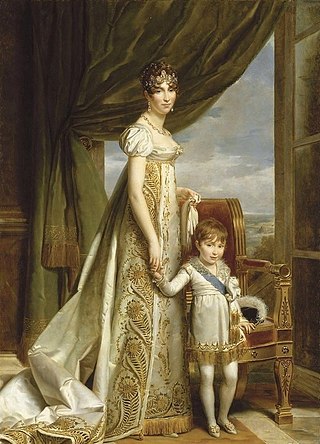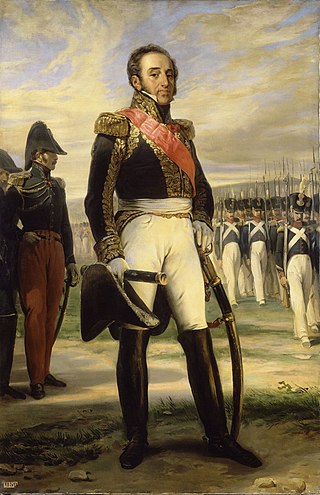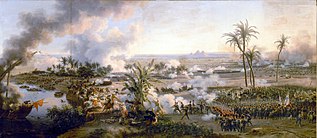
The House of Bonaparte is a former imperial and royal European dynasty of French and Italian origin. It was founded in 1804 by Napoleon I, the son of Corsican nobleman Carlo Buonaparte and Letizia Buonaparte. Napoleon was a French military leader who rose to power during the French Revolution and who, in 1804, transformed the French First Republic into the First French Empire, five years after his coup d'état of November 1799. Napoleon and the Grande Armée had to fight against every major European power and dominated continental Europe through a series of military victories during the Napoleonic Wars. He installed members of his family on the thrones of client states, expanding the power of the dynasty.

Louis Napoléon Bonaparte was a younger brother of Napoleon I, Emperor of the French. He was a monarch in his own right from 1806 to 1810, ruling over the Kingdom of Holland. In that capacity, he was known as Louis I.

Jérôme-Napoléon Bonaparte was the youngest brother of Napoleon I and reigned as Jerome Napoleon I, King of Westphalia, between 1807 and 1813.

Prince Napoléon Joseph Charles Paul Bonaparte, usually called Napoléon-Jérôme Bonaparte or Jérôme Bonaparte, was the second son of Jérôme, King of Westphalia, youngest brother of Napoleon I, and his second wife Catharina of Württemberg. Following the death of his nephew Louis-Napoléon, Prince Imperial in 1879, he claimed headship of the House of Bonaparte until his death in 1891. An outspoken liberal however, he was passed over as heir in his cousin's final will, which instead chose his elder son Victor, who was favored by most Bonapartists. From the 1880s onwards, he was one of the stronger supporters of General Georges Boulanger, together with other monarchist forces.

Joseph-Napoléon Bonaparte was a French statesman, lawyer, diplomat and older brother of Napoleon Bonaparte. During the Napoleonic Wars, the latter made him King of Naples (1806–1808), and then King of Spain (1808–1813). After the fall of Napoleon, Joseph styled himself Comte de Survilliers and emigrated to the United States, where he settled near Bordentown, New Jersey, on an estate overlooking the Delaware River not far from Philadelphia.

Lucien Bonaparte, 1st Prince of Canino and Musignano, was a French politician and diplomat of the French Revolution and the Consulate. He served as Minister of the Interior from 1799 to 1800 and as the president of the Council of Five Hundred in 1799.

Prince Pierre-Napoléon Bonaparte was a French nobleman, revolutionary and politician, the son of Lucien Bonaparte and his second wife Alexandrine de Bleschamp. He was a nephew of Napoleon I, Joseph Bonaparte, Elisa Bonaparte, Louis Bonaparte, Pauline Bonaparte, Caroline Bonaparte and Jérôme Bonaparte.

Hortense Eugénie Cécile Bonaparte was Queen consort of Holland. She was the stepdaughter of Emperor Napoléon I as the daughter of his first wife, Joséphine de Beauharnais. Hortense later married Napoléon I’s brother, Louis Bonaparte, who had been made King of Holland, making her her stepfather’s sister-in-law. She was the mother of Napoléon III, Emperor of the French; Louis II of Holland; and Napoléon Louis Charles Bonaparte who died at the age of four. She also had an illegitimate son, Charles, Duke of Morny, with her lover, the Comte de Flahaut.

Louis-Gabriel Suchet, duc d'Albuféra, was a French Marshal of the Empire and one of the most successful commanders of the French Revolutionary and Napoleonic Wars. He is regarded as one of the greatest generals of the Napoleonic Wars.

The following is a timeline of the French Revolution.

The Battle of the Pyramids, also known as the Battle of Embabeh, was a major engagement fought on 21 July 1798, during the French Invasion of Egypt. The battle took place near the village of Embabeh, across the Nile River from Cairo, but was named by Napoleon after the Great Pyramid of Giza visible nearly nine miles away.

Napoléon-Louis Bonaparte was King of Holland for less than two weeks in July 1810 as Louis II. He was a son of Louis Bonaparte and Queen Hortense. His father was the younger brother of Napoleon I of France who ruled the Napoleonic Kingdom of Holland from 1806 to 1810. His mother was the daughter of Josephine de Beauharnais, Napoleon's first wife. His younger brother, Louis-Napoléon, became Emperor of the French in 1852 as Napoleon III.

Charlotte Napoléone Bonaparte was the daughter of Joseph Bonaparte, the older brother of Emperor Napoleon I, and Julie Clary. She was active as an artist.

Charles, Prince Napoléon is a French politician who is the disputed head of the Imperial House of France and, as such, heir to the legacy of his great-great-granduncle, Emperor Napoléon I.
Marchand is a frequent surname in France, in Quebec, and in Louisiana.. It is sometimes anglicized to "Merchant", "Marchant", or "Merchand", all with similar pronunciations to Marchand.

Louis-Joseph-Narcisse Marchand was Napoleon Bonaparte's valet and the nominated liquidator of his succession.
Constant is a given name, and may refer to:

Jean Gabriel Marchand, 1st Count Marchand went from being an attorney to a company commander in the army of the First French Republic in 1791. He fought almost exclusively in Italy throughout the French Revolutionary Wars and served on the staffs of a number of generals. He participated in Napoleon Bonaparte's celebrated 1796-1797 Italian campaign. In 1799, he was with army commander Barthélemy Catherine Joubert when that general was killed at Novi. Promoted to general officer soon after, he transferred to the Rhine theater in 1800.
Events from the year 1802 in France.
Napoléon is the French form of the Italian given name Napoleone. Notable people with the name include:















